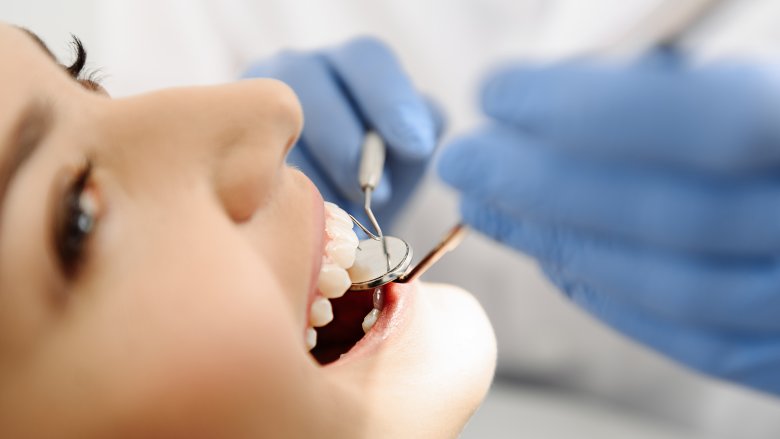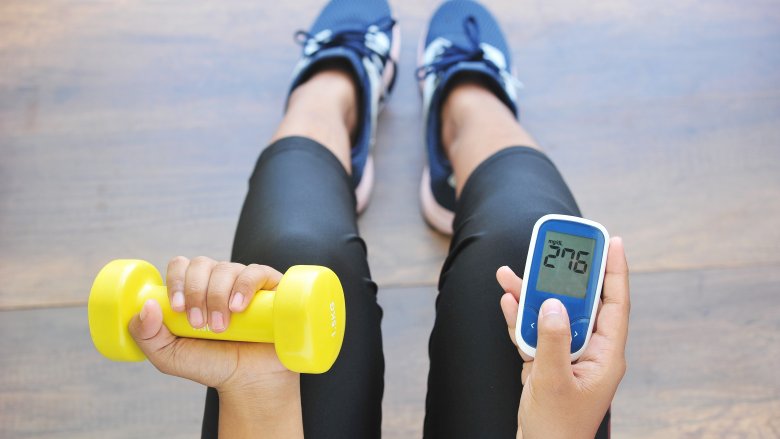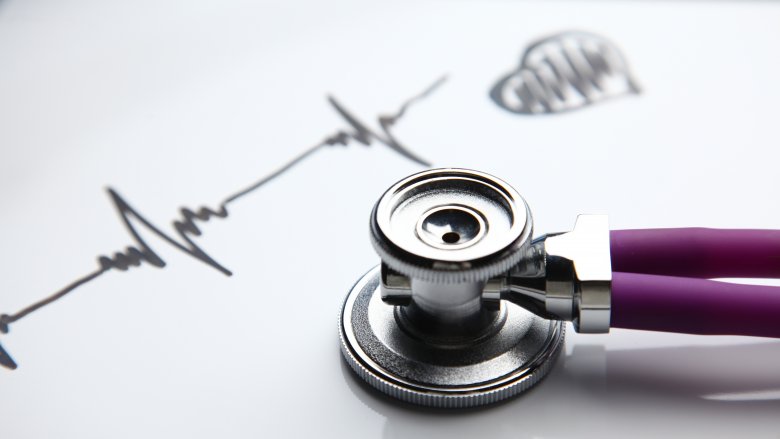What Happens To Your Body When You Cheat On Your Diet
We may receive a commission on purchases made from links.
Sticking to a specific diet is never easy. In fact, many of us start thinking about how we can cheat the moment we commit to a diet. It's human nature and we all fall off the wagon from time time. Because a cheat meal or day will come up for most of us, it's important to know how that will affect our progress and overall health.
Eating junk food over a long period of time will of course put your health at risk, but even just one unhealthy meal could you at a higher risk for diabetes and heart disease. I spoke with health and fitness experts about their thoughts on cheating on your diet and just what happens to your body each time you do.
Your tongue might look different
Here's one I didn't see coming. Many naturopathic health practitioners could know immediately if you cheated on your diet based on what your tongue looks like. "Many things happen when you cheat on your diet. Aside from spikes in blood sugar, inflammation, acne, and swelling, doctors of Chinese medicine have several ways to see what is occurring with the interior ecology of your body," Acupuncturist Dr. Elizabeth Trattner told me. "The best way for us is to look at your tongue and take your pulses. We can even tell if our regular patients are cheating and not telling us because we become familiar with what your tongue normally looks like."
Dr. Trattner told me that according to Chinese medicine, eating an unhealthy meal can cause heat, dampness, or stagnation in the body. "Dampness will present with a thick white or yellow coat on the tongue," she explained. "Stagnation will have some shade of a purple tongue and perhaps scalloping along the sides. There may be purple veining under the tongue as well." So next time you swing by the drive-thru, take a look at your tongue the next day to see what changes you notice.
You may get heartburn
As Dr. Trattner noted, cheating on your diet can cause heat in your body and that can manifest as heartburn. "Heat can look like heartburn, restless sleep, bowels that can burn your rear end, and can be a result of spicy food, alcohol, greasy meat or food, and the tongue will have a red tip or red in the interior and or sides," explained Dr. Trattner.
If you suffer from occasional heartburn, start paying attention to the exact times it happens and what you recently ate. Talk with your doctor or naturopath about how to manage and prevent the heartburn in the future.
Your body could become inflamed
When your body is used to healthy, nutritious foods, one meal or day of going for the high-fat and high-sugar goodies can leave you feeling bloated and sluggish.
"When people cheat, it's usually with foods that are loaded with sugar and fats, and that causes a lot more than just weight gain. Cheating with sugary, high-fat foods wreaks havoc on the body and causes inflammation to rise," Holistic Nutritionist Miriam Amselem told me. "Some of my clients complain about their joints hurting them when they cheat, and that's usually because of inflammation. They also feel bloated, uncomfortable, and sluggish. Some also feel irritable, because of sugar highs and lows."
You could be more successful in your overall diet
Even though cheating on your diet could cause some temporary inflammation and heartburn, it may be worth it. Experts believe that occasionally taking a day off from your diet can help you be more successful in the long run. This is because treating yourself once in awhile keeps you from feeling deprived and just giving up when it's too hard. However, the trick is to make sure your cheat meal does not turn into a cheat month.
"Usually after three to four weeks of an intensive weight-loss plan that I design for my patients, I introduce the food vacay," Registered Dietitian and author of Eat to Lose, Eat to Win Rachel Beller told Women's Health. Beller recommended having a specific plan around your cheat meal to keep it from getting out of control. "Organize it around a meal, or just say that you'll be more relaxed about your lunch and dinner," she advised.
You may feel less hungry
When you decide to cheat on your diet, it's important to listen to your body when you want to get back on track. Often we're so busy beating ourselves up for one slip, that we miss valuable information from our bodies. For example, after a big burger and fries, you're probably not going to be hungry again for awhile, so pay attention.
"It's alright to overeat occasionally. It's overeating consistently day in and day out over the long term that causes weight gain," Registered Dietitian Nichola Whitehead told Business Insider. "If you overeat one night you'll probably be less hungry the following day. So it's really important to listen to your body. It's what you're doing over the long term that's really going to make a difference."
You may develop cavities
It turns out your mom and dentist were right — a candy binge can lead to cavities. According to a study in the Journal of Evidence Based Dental Practice, our diets play a huge role in our oral health. Researchers studied the dental reports of adults with a reported high intake of junk food, such as sugar and soft drinks. The vast majority of study participants had severe cavities and researchers believed this was due to their soda intake. If cheating on your diet means a daily soda, start cutting back and replacing it with sparkling water or unsweetened tea.
You could feel depressed
When your middle school health teacher told you that you are what you eat, she wasn't kidding. What we put into our bodies affects just about every aspect of our health, even our moods. Eating foods with low nutritional value is associated with feeling more depressed.
According to a study in PLOS One, a person's diet can predict their depression level. Study participants who reported eating more junk food also scored higher on depression screenings. Of course there are other factors to consider. For example, perhaps people who are already depressed are just more likely to eat junk food, and that is why the two are linked. Nevertheless, cleaning up your diet and sticking with a food plan that makes you feel good certainly can't hurt. And if you fall off the wagon, don't waste time feeling guilty and depressed. Simply make yourself a green smoothie and climb back on.
You may be more at risk for type 2 diabetes
Eating a diet high in sugar and fat will certainly put you at higher risk for diabetes over time, but what about one cheat meal? Something as small as going out for a few beers with friends can actually affect your diabetes risk.
According to a study in the American Journal of Clinical Nutrition, when we drink a beer our blood sugar levels go up, but our insulin levels do not. Usually our insulin rises with our blood sugar to keep it at a steady level, but the beer inhibits the insulin response. This means that one beer could potentially lead to a high blood sugar level without our body being able to bring it down right away and high blood sugar levels lead to complications including diabetes. If you do decide to meet your friends for a drink, make sure to drink plenty of water and turn down the sugary snacks on the table.
You may be at higher risk for a heart attack
Much like with diabetes risk, I had always assumed that a lifetime of eating a poor diet would put you at higher risk for heart disease, but it turns out that it doesn't take a lifetime — just one high-fat meal could send you over the edge to a heart attack. A study by the American Heart Association described the higher incidence of heart attacks on Christmas day and New Year's Eve, presumably because people are eating large meals full of rich foods. Holiday stress could certainly contribute too, but the foods are definitely a factor.
A study in the Journal of Nutrition found that after eating one high-fat meal, your heart will not react to stress as well as it normally would. Your heart will actually have to work harder. So when your drunk uncle starts talking politics after Thanksgiving dinner, rather than getting fired up and arguing, just walk away. Your heart can't take it!
Your arteries could be damaged
Cheating on your diet could be a split second decision, but that decision could lead to some major complications. A study in the American Journal of Cardiology found that a single high-fat meal can affect how our blood vessels work. Blood vessel function was impaired when study participants ate a fatty meal, but unaffected with they ate a low-fat meal.
A separate study in the Canadian Journal of Cardiology had the same findings with high-fat meals. Researchers also asked participants to eat a Mediterranean-type meal, which is also high in fats, but healthy fats like fish and nuts. After a Mediterranean meal, study participants did not have the impaired blood vessel function that they showed after eating a meal high in saturated fat.
In addition to affecting your blood vessels, a high-fat "cheat" meal can change your blood pressure too. A study from Cambridge University found that a high-fat meal can cause your blood pressure to go up after eating it. However, when participants ate healthier fats, their blood pressures actually went down after eating.
Maybe nothing
Even though there are plenty of possible complications from cheating on your diet, chances are that one cheat meal will not affect your health in the long-term. Perhaps that is why so many health professionals support cheating once in a while. In fact, switching up your diet may be just what your body needs.











